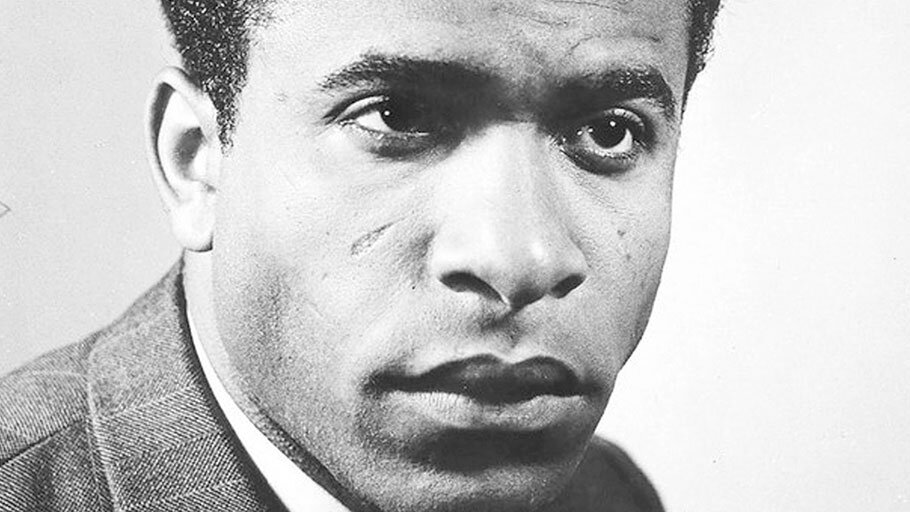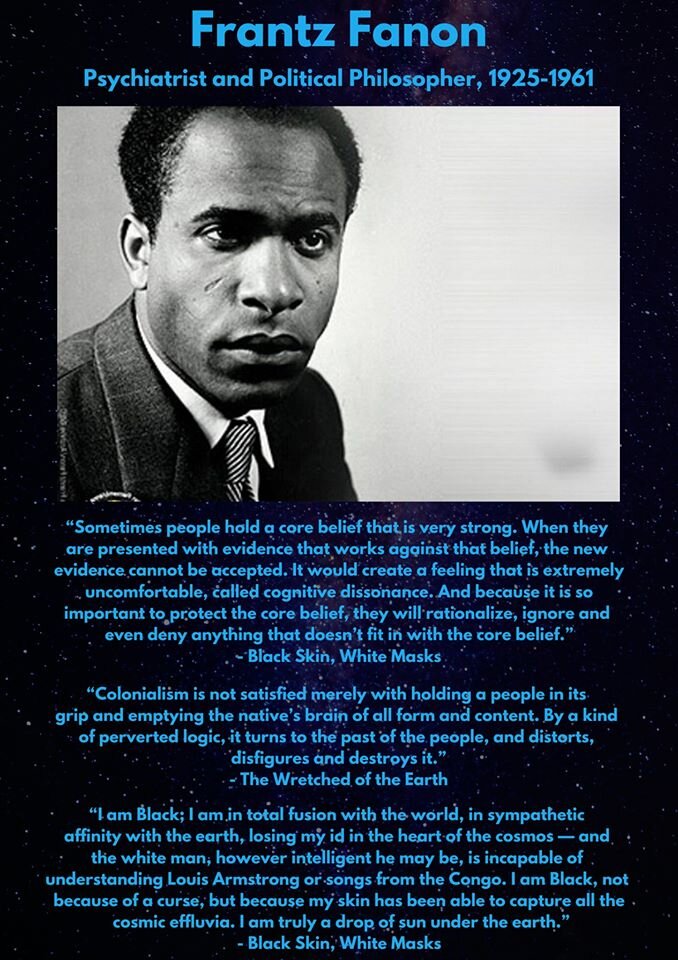
Frantz Fanon
Psychiatrist and Political Philosopher (1925-1961)
Anushka Shah discusses Fanon’s life and work, and gives recommendations for reading and listening.
Biography
There is often value in not merely viewing political and philosophical texts as isolated from their authors. Instead, through looking at them within the context of the authors’ backgrounds, we may hope to achieve an appreciation of why an author wrote as they did, or hope to achieve a more nuanced understanding of their work.
Frantz Fanon is one such political philosopher whose life is inextricability linked with, and undoubtedly influenced, his work. Born in the French colony of Martinique in 1925, Fanon fought with the Free French Forces during World War Two, and he later reflected on his experiences of racism within the army. He ‘found himself disillusioned by the racial hierarchy within the military. “The French," he wrote, "do not like the Jews, who do not like the Arabs, who do not like the Negroes.”’[1] After the war, he wrote what would later become one of his most influential works, Peau Noire, Masques Blancs (Black Skin, White Masks), while studying Medicine and Psychiatry at the University of Lyon. He hoped to submit his paper as his dissertation, but it was deemed ‘too subjective and experimental’[2]. Upon its eventual publication in 1952, Peau Noire, Masque Blancs ‘puzzled readers with its mix of literary, psychoanalytic and philosophical observations’[3]. Readers today comment upon the clarity yet characteristic eloquence and literary prowess with which Fanon conducted his writings.
Fanon took up a post at a hospital in Saint-Alban-sur-Limagnole, France, and after qualifying as a psychiatrist, he became head of a psychiatric hospital in Blida, Algeria. When the Algerian War of Independence broke out between the Algerian Front de Libération Nationale (FLN) and France, Fanon found himself in an odd position: he was simultaneously treating ‘the psychological distress of the soldiers and officers of the French army who carried out torture in order to suppress anti-colonial resistance’ and the Algerians who were the victims of this torture[4]. Much to his discomfort, he found that the hospital was ‘not keen on treating the natives’, and the ‘psychiatric theories followed by doctors and nurses [assumed]… the innate savagery, criminality and propensity to violence of the Arab and the [B]lack man’[5]. He resigned from his post, and his experiences at Blida are drawn upon in his Les Damnés de la Terre (The Wretched of the Earth). In this work, also one of his most famous, he argues that ‘violence was not immanent to the [B]lacks, it was produced in them by the injustice of colonial domination’[6].
Following his resignation, Fanon joined the Front de Libération Nationale. While based in Tunisia, he wrote articles, trained nurses, and edited El Moudjahid (FLN’s newpaper). He published a series of essays titled L’An Cinq de Révolution Algérienne (also published as ‘A Dying Colonialism’) in 1959. Soon after, Fanon was diagnosed with Leukaemia and died from double pneumonia in 1961. A collection of his other writings was published posthumously as Pour la Révolution Africaine (Toward the African Revolution). Before his death, he managed to complete Les Damnés de la Terre, which proved so controversial that it was confiscated from Parisian bookstores by the French authorities on the day of his death.
The cover image is a close-up of Frantz Fanon, who is wearing a suit and looking away from the camera. This biography is condensed from Nayar (2003) and (IEP, 2020).
[1] Columbia College, 2020. Frantz Fanon. [Online]
Available at: https://www.college.columbia.edu/core/content/frantz-fanon
[2] Nayar, P. K., 2003. Frantz Fanon. Abingdon: Routledge
[3] Nayar, P. K., 2003. Frantz Fanon. Abingdon: Routledge
[4] Internet Encyclopedia of Philosophy, 2020. Frantz Fanon (1925-1961). [Online]
Available at: https://iep.utm.edu/fanon/
[5] Nayar, P. K., 2003. Frantz Fanon. Abingdon: Routledge
[6] Nayar, P. K., 2003. Frantz Fanon. Abingdon: Routledge
Recommendations
For ‘casual’ engagement
Podcast – ‘Violence and Resistance – Frantz Fanon’
This is a podcast on the life, work and legacy of Frantz Fanon from The Brooklyn Institute for Social Research. It can be listened to and downloaded directly from the Brooklyn Institute for Social Research website, or it can be found on iTunes.
Podcast – ‘Frantz Fanon, Black Skin, White Masks’
This is a podcast by ‘Always Ready Podcast’, with text-based discussion of Frantz Fanon’s ‘Black Skin, White Masks’.
Reading
‘Black Skin, White Masks’ (Peau Noire, Masques Blancs). ‘The central metaphor of this book…[is] that black people have to wear ‘white masks’ in order to get by in a white world. ...Fanon examines how race shapes (deforms) the lives [of people]’ (IEP, 2020).
‘The Wretched of the Earth’ (Les Damnés de la Terre). A ‘more abstract analysis of colonialism and revolution. It has been described as a handbook for black revolution… Part of its shocking quality, from a philosophical perspective, is alluded to in the preface that Jean-Paul Sartre wrote for the book: it speaks the language of philosophy and deploys the kind of Marxist and Hegelian arguments one might expect in a philosophy of liberation, but it does not speak to the West. It is Fanon conversing with, advising, his fellow Third-World revolutionaries.’ (IEP, 2020).
Further recommendations
Fanon’s ‘A Dying Colonialism’ (1959).
Fanon’s ‘Toward the African Revolution’ (1964).
